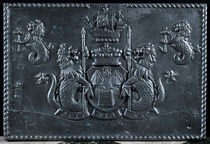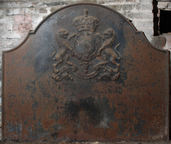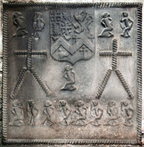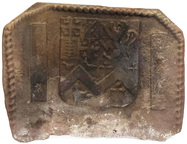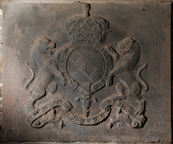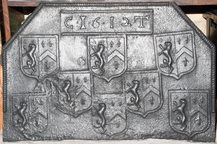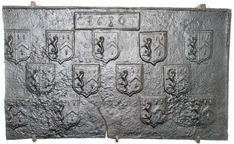-
1093
Description: Rectangular; simulated twisted rope edging with a gap, top centre; centre, shield, baron's coronet, supporters and crest; in each top corner, heraldic badge - a Sea Lion holding an anchor.
Notes: The arms are of Sir Hudson Ewbanke Kearley, Bt., 1st Baron Devonport (1856-1934); created 1910, he was elevated to Viscount in 1917, thus the fireback would have been cast between 1910 and 1917. Blazon: Azure in chief two Mitres Argent garnished Or and in base a Square Tower of the second, a baronet's badge in chief; Supporters: On either side a Sea Lion Argent crined finned and tufted Or each gorged with a Collar Gules charged with three Roses of the second and each supporting a Spear erect proper; Crest: An Ancient Ship Or the Mainsail Azure charged with a Sea Lion of the first; Motto: Fit Via Vi (The way is made through strength). A version with the same arms and badges has an arched rectangular shape and plain edging.
Inscription: FIT VIA VI
Arms: Hudson Ewbanke Kearley, 1st Baron Devonport (later 1st Viscount)
- Decoration tags:
- rectangular (shape)
- simulated rope (edging)
- heraldic
- armorial
- text
Manufactured: in the early-20th century in England.
Current location:, not known.
- Attached to series:
- Personal armorial firebacks
- Devonport arms series
-
790
Description: Rectangular with arched rectangular shaped top joined by cavetto curves; astragal edging; shield, supporters, ducal coronet, motto and garter of the Duke of Dorset: Quarterly, Or and gules, a bend vair.
Notes: Almost certainly the arms of Lionel Sackville KG (1688-1765), created first duke of Dorset in 1720; many different firebacks exist, all with precisely the same armorial stamp.
Inscription: [around shield] HONY SOIT QUI MAL Y PENSE / [on motto scroll] AUT NUNQUAM TENTES, AUT PERFICE
Arms: Lionel Sackville, 1st Duke of Dorset
- Decoration tags:
- rectangular with canted top corners and round arch (shape)
- astragal (edging)
- carved pattern panels
- armorial
- text
Manufactured: in the early-18th century in the Weald area of England.
Current location: in private hands, Whatlington, East Sussex, England.
- Attached to series:
- Dorset arms series
- Personal armorial firebacks
- Sackville firebacks
-
920
Description: Rectangular; twisted rope edging; top centre, quartered shield between four 'imp' figures, left facing, one with right arm raised, one of each on each side; below each pair of figures, a rope cross above an inverted V in rope, with an 'imp' figure, arms lowered, below the shield; along the bottom, eight 'imp' figures, alternately arms raised and lowered.
Notes: The 'imp' figures are common on a group of firebacks, the rope designs having a probable apotropaic significance. The arms are probably of Thomas Wriothesley, who was Henry VIII's last Lord Chancellor and created Earl of Southampton in 1547; he married c.1533 so the arms could date to before then, but the same arms are displayed on his enamelled stall plate in St George's Chapel, Windsor, of 1545, and in stained glass in a window in the parish church at South Warnborough, Hampshire. The shield is, quarterly, 1. Wrythe or Wriothesley quartering Dunstanville and Pink, 2. Drayton, 3. Crocker and 4. Peckham. The same armorial stamp has been noted on at least two other firebacks. A candidate for the earliest English fireback with an example of personal arms.
Arms: Wriothesley (Earl of Southampton)
- Decoration tags:
- rectangular (shape)
- rope (edging)
- simple stamps
- carved stamps
- apotropaic
- armorial
- humans
- objects
Manufactured: in the mid- to late-16th century in the Weald area of England.
Current location: in private hands, Wigmore, Herefordshire, England.
- Attached to series:
- Royal series
- Personal armorial firebacks
- Wriothesley firebacks
-
1305
Description: Quasi-rectangular with canted top corners; twisted rope edging (top and sides); centre top, quartered shield between two vertical carved stamps of a billet with five oval shapes.
Notes: The arms are probably of Thomas Wriothesley, who was Henry VIII's last Lord Chancellor and created Earl of Southampton in 1547; he married c.1533 so the arms could date to before then, but the same arms are displayed on his enamelled stall plate in St George's Chapel, Windsor, of 1545, and in stained glass in a window in the parish church at South Warnborough, Hampshire. The shield is, quarterly, 1. Wrythe or Wriothesley quartering Dunstanville and Pink, 2. Drayton, 3. Crocker and 4. Peckham. A candidate for the earliest English fireback with an example of personal arms. It is possible that this casting is the one formerly at Warnham Court, Sussex, which was illustrated by J. Starkie Gardner in Country Life in 1907. A similar fireback is no. 334. William Smith Auctions, Plainfield, NH, 20 Nov 2024, lot 424 ($250).
Arms: Wriothesley (Earl of Southampton)
- Decoration tags:
- rectangular with canted top corners (shape)
- simple stamps
- carved stamps
- heraldic
- armorial
- objects
Manufactured: in the mid- to late-16th century in the Weald area of England.
Current location: not known.
Citation: Gardner, J. S., 25 May 1907, 'Old Wealden Ironwork at Warnham Court', Country Life, pp. 730-2.
- Attached to series:
- Wriothesley firebacks
- Royal series
- Personal armorial firebacks
-
799
Description: Rectangular; plain plate with shield, supporters, ducal coronet, motto and garter of the Duke of Dorset: Quarterly, Or and gules, a bend vair.
Notes: Almost certainly the arms of Lionel Sackville KG (1688-1765), created first duke of Dorset in 1720; many different firebacks exist, all with precisely the same armorial stamp.
Copies of this fireback are known.
Inscription: [around shield] HONY SOIT QUI MAL Y PENSE / [on motto scroll] AUT NUNQUAM TENTES, AUT PERFICE
Arms: Lionel Sackville, 1st Duke of Dorset
- Decoration tags:
- rectangular (shape)
- none (edging)
- carved stamps
- armorial
- text
Manufactured: in the early-18th century in the Weald area of England.
Current location: in private hands, Withyham, East Sussex, England.
- Attached to series:
- Dorset arms series
- Sackville firebacks
- Personal armorial firebacks
-
800
Description: Rectangular; plain plate with shield, supporters, ducal coronet, motto and garter of the Duke of Dorset: Quarterly, Or and gules, a bend vair.
Notes: Almost certainly the arms of Lionel Sackville KG (1688-1765), created first duke of Dorset in 1720; many different firebacks exist, all with precisely the same armorial stamp.
Inscription: HONI SOIT QUI MAL Y PENSE / AUT NUNQUAM TENTES, AUT PERFICE [Either do not attempt, or complete]
Arms: Lionel Sackville, 1st Duke of Dorset
- Decoration tags:
- rectangular (shape)
- none (edging)
- carved stamps
- armorial
- text
Manufactured: in the early-18th century in the Weald area of England.
Current location: in private hands, Withyham, East Sussex, England.
- Attached to series:
- Dorset arms series
- Sackville firebacks
- Personal armorial firebacks
-
1192
Description: Canted rectangular shape; twisted rope edging formed of six lengths of 23cm (top and sides); top centre, rectangular panel with cavetto-moulded edging (left side missing) enclosing date between initials CT, all interposed with dots; below, eight shields of Ayloffe impaling Sulyard in three rows (3-2-3); Ayloffe: sable, a lion rampant Or, collared gules, between three crosses formy of the second; Sulyard: argent, a chevron gules between three pheons inverted sable.
Notes: William Ayloffe (c1535-1584) of Bretons, Hornchurch, Essex, Justice of the Court of Queen’s Bench, married (c1560) Jane, dau. of Sir Eustace Sulyard, of Runwell, Essex. The initials 'CT' are likely to be those of Charles Tyler, a founder whose working life and that of his family have strong parallels with the occurrence of these firebacks. The excrescence affecting the left shield in the middle row and the blemish left of the middle shield in the top row are the result of inexpert ladling of the iron during casting. Previously at Smarden, Kent. The absence of the left side of the frame of the inscription panel has also been noted on another back in this series, also dated 1612.
Inscription: C.1.6.1.2.T
Arms: Ayloffe impaling Sulyard (William Ayloffe of Bretons, Hornchurch)
- Decoration tags:
- rectangular with canted top corners (shape)
- rope (edging)
- carved stamps
- individual letters
- individual numbers
- heraldic
- armorial
- text
Manufactured: in 1612 possibly at Bedgebury Furnace, Goudhurst in the Weald area of England.
Current location: in private hands, Crawley, West Sussex, England.
- Attached to series:
- Ayloffe series
- Personal armorial firebacks
-
1008
Description: Rectangular; twisted rope edging on top and (probably both) sides; cavetto-moulded-edged rectangle top centre, enclosing date between initials; 13 shields of Ayloffe impaling Sulyard in three rows (5-4-4), the bottom row having a gap between the middle pair of shields; Ayloffe: sable, a lion rampant Or, collared gules, between three crosses formy of the second; Sulyard: argent, a chevron gules between three pheons inverted sable.
Notes: William Ayloffe (c1535-1584) of Bretons, Hornchurch, Essex, Justice of the Court of Queen’s Bench, married (c1560) Jane, dau. of Sir Eustace Sulyard, of Runwell, Essex. About 110mm of the left side has broken off suggesting an original width of 1340mm. The initials 'CT' are likely to be those of Charles Tyler, a founder whose working life and that of his family have strong parallels with the occurrence of these firebacks.
Inscription: C 1610 T
Arms: Ayloffe impaling Sulyard (William Ayloffe of Bretons, Hornchurch)
- Decoration tags:
- rectangular (shape)
- rope (edging)
- carved stamps
- individual letters
- individual numbers
- armorial
- text
Manufactured: in 1610 possibly at Bedgebury Furnace, Goudhurst in the Weald area of England.
Current location: Wye College, High Street, Wye, Kent, England.
- Attached to series:
- Ayloffe series
- Personal armorial firebacks
